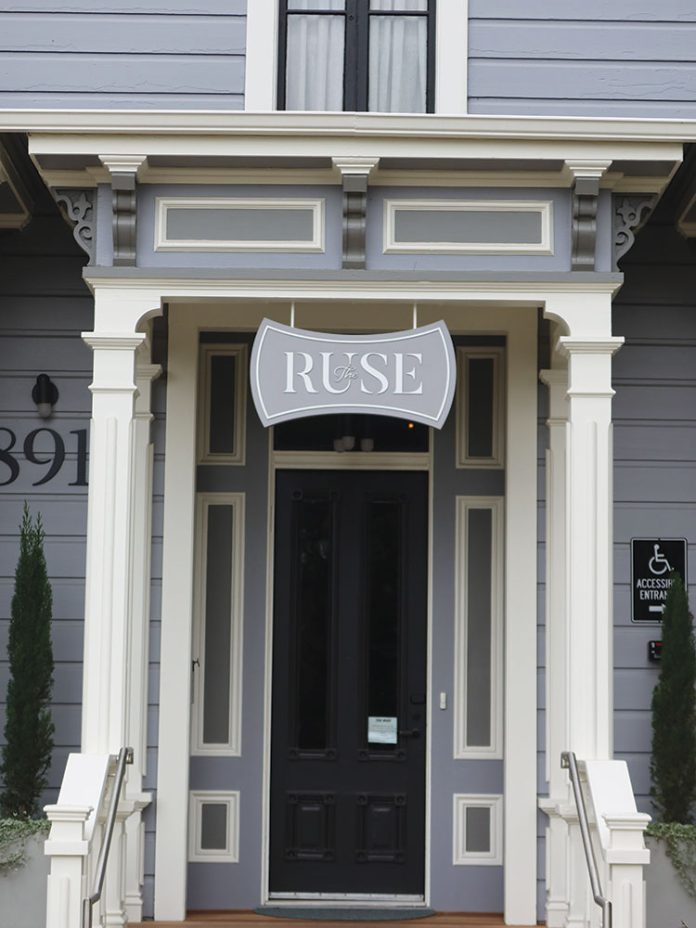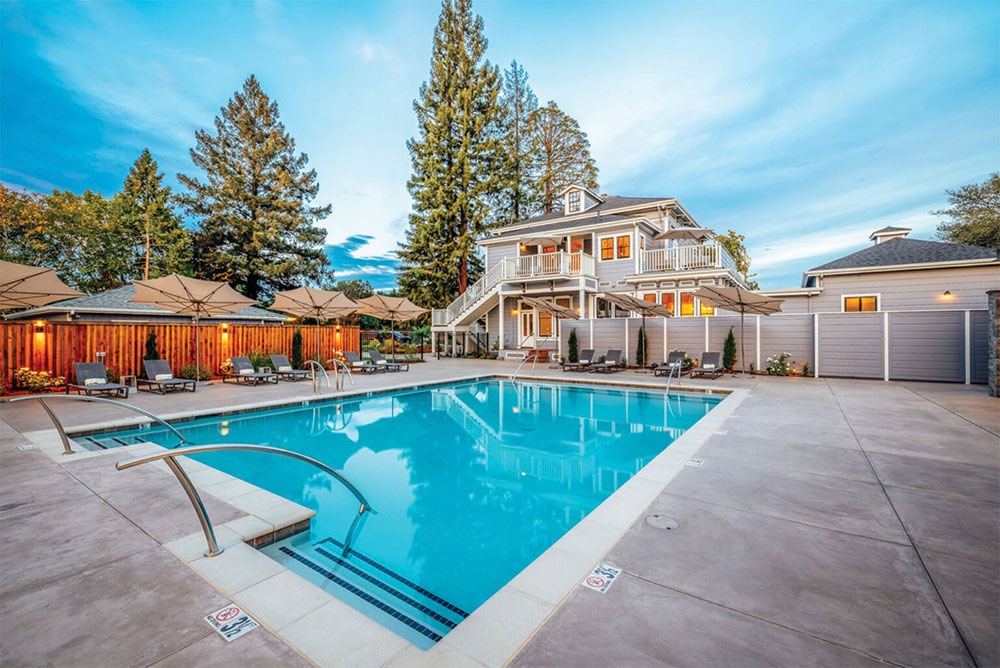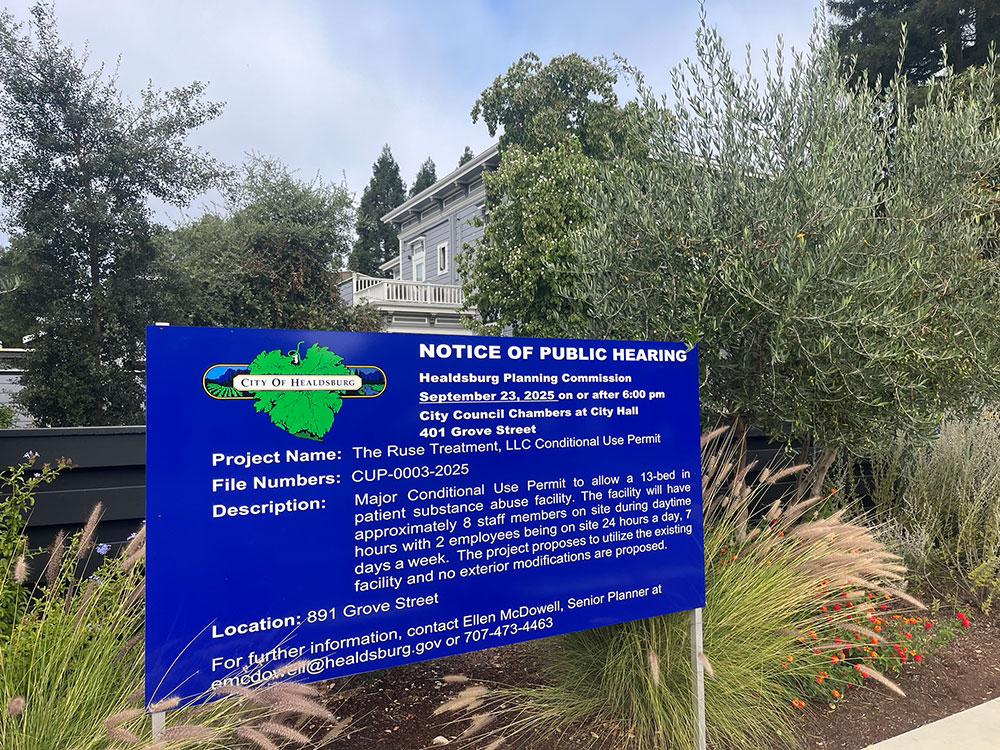
What many were expecting to be another struggle between Healdsburg’s Planning Department and the owners of 891 Grove St., also known as The Ruse, turned out to be a relatively mild hearing that ended in tacit agreement—though suspicions and conflicts remain.
After two hours of discussion on Sep. 23, the commission voted 5-1 to approve the conditional use permit for the property, and the neighboring lot at 893 Grove, as a “luxurious 13 bed Substance Use Disorder Facility,” to be renamed The Ruse Treatment.
The only dissenting vote was from Commissioner Jonathan Pearlman, who had joined Phil Luks in raising questions about the planned extended use of the kitchen from one meal a day (when there are guests at the B&B) to three meals a day, for 30-day stretches at a time.
The proposal itself states that, “The facility will operate as a luxurious 13 bed Substance Use Disorder Facility,” seemingly a far cry from the other more recreational uses the owners have proposed.
“The project proposes to operate a non-12-step program that will include therapy, counseling, and holistic practices like yoga, meditation and acupuncture. The facility will include medically supervised detox, dual diagnosis care, and customized aftercare,” the project description reads.

One aspect of this post-New-Age care: Golf Therapy. “A unique experiential offering… uses the sport to promote mindfulness, stress relief, and peer connection, blending physical activity with therapeutic reflection to support sobriety.” There is a professional-level putting green on the property, and owners Patrick and Jonathan Wilhelm also own the Mayacama Golf Club and Resort outside of Santa Rosa.
Although the B&B permit The Ruse operates under allows for 12 units, the proposal is for a 13-resident program, with lodging including seven rooms in the main building, four “Greenside” suites, an additional detached bedroom referred to as the Squire’s Cottage and a new bedroom installed in the current laundry maintenance building.
This newly added bedroom would be the most significant remodel, but it doesn’t rise to the level of a separate permit. “The accommodations, the amenities of that room are not as nice as the other 12 rooms,” said Brian Stoesz, a colleague of the applicant Keith Greenberg. “That’s gonna be either kind of an overflow, or a room that we may negotiate price points a little bit. Maybe someone wants to come in instead of spending $50,000-$60,000 for the month; maybe they want to spend a little bit less.”

With Senior Planner Ellen McDowell overseeing the application, major staff findings of their conditional use permit application did not find anything serious to flag in the proposal. “The proposed location and operation of the conditional use and the conditions under which it would be operated or maintained will not be detrimental to the public health, safety or welfare or materially injurious to properties or improvements in the vicinity,” the findings read.
Both applicant and staff agreed that “no exterior modifications are proposed,” thereby limiting their exposure to objections. As such, “The project is found to be in compliance with all relevant city zoning or other ordinances, and thus the staff recommendation is that the Planning Commission approve the applications.”
Conditions of approval
The staff report did attach several conditions of approval, and more were proposed by attorney Rose Zoia, on behalf of Ariel Kelley, a next-door neighbor of the Grove Street property. Kelley, a member of the City Council, also made public statements during the meeting after clarifying she was speaking as a resident, not as an office holder.
The adopted conditions reduce the number of proposed smoking areas on the property from three to two, limit event participants to 30 and prohibit amplified sound at such, maintain appropriate state and local licensing, and require the automatic suspension of the use permit upon any code violations—though Planning Director Scott Duiven said “due process” would be followed.

On the issue of the increased use of the kitchen for food preparation, the conditions were slightly modified to stipulate only that, “The applicant shall investigate ways to reduce odors associated with the kitchen facilities.” Calls for increased public outreach from The Ruse to the neighbors, however, failed to make the list of conditions.
Those two shortcomings in the conditions may have led to Pearlman’s unexplained but notable “no” vote, and did not fully satisfy the neighbors in attendance at the Sept. 23 meeting.
Active appeals
The status of The Ruse’s relationship with the City of Healdsburg meanwhile continues to be in flux. There remain active court appeals, despite a $60,000 settlement payable to The Ruse’s lawyers as decided in a recent Sept. 7 court settlement. And The Ruse continues its litigation over the city’s denial of its conditional use permit for the private sports club, which may take some time to work its way through the appeals court.
Meanwhile, the Ruse has an application with the Alcoholic Beverage Control for a license to serve beer, wine and liquor, an application clearly at odds with a substance abuse treatment facility. That raises the possibility that the proposed use as a treatment facility is planned as a fall-back measure, should The Ruse’s lawsuit against the city fail and/or the liquor license be denied.
“The approval of the substance abuse facility does not negate the ABC license, however commencement of that use would,” Duiven said. “The Ruse cannot operate as a treatment facility and a B&B at the same time, and the treatment facility cannot have a license to serve alcohol.”
Duiven pointed out that according to the approved conditions, “they have one year to commence operations or request one of two allowed one-year extensions. They are not bound to move forward with the project, but they have the approval to do so.”








